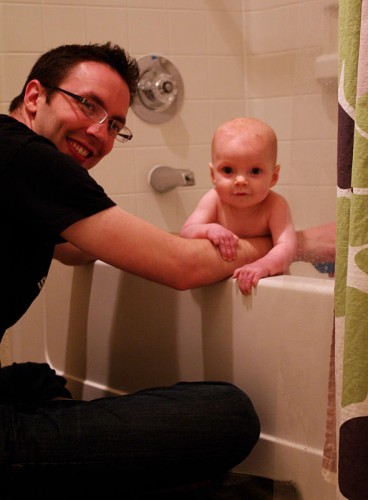To start, an anonymous commenter asked me to read this book. It is unlikely I would have selected this for reading material without prompting. Also, I know nothing about Jonah Goldberg outside of this book. I don’t know who he is, what he does, or why anyone should care what he thinks. So my opinions are not built around any personal like or dislike of Goldberg himself.
I’d like to preface my remarks by plainly admitting that clichés generally lack depth and nuance. Generally because it’s hard to include depth and nuance in an one-sentence sound-bite. But just because they have obvious and glaring exceptions does not mean there’s nothing worth hearing from them.
I’ll even agree with Goldberg that when clichés are used as discussion-enders the people who use them as such do a disservice to society. Like using Wikipedia for research, clichés should be a starting point rather than a stopping point.
Honestly, I kept this as short as I could, but it’s still longer than I’d like for a blog post. But let’s get started.
“One man’s terrorist is another man’s freedom fighter.”
Goldberg introduces his book with his criticism for “One man’s terrorist is another man’s freedom fighter.” One example he uses is Martin Luther King Jr.:
Most reasonable and decent people would recoil at the suggestion that Martin Luther King was a terrorist (some liberals might interject at this point and say, “Aha, but some Southern racists said exactly that about King!,” to which a sane person would respond, “Yes, and they were wrong to do so”). (p5)
Goldberg takes an example entirely supporting the idea the cliché represents and then dismisses it because the people holding the viewpoint that King was a terrorist are wrong. This seems to be a blatant misunderstanding of what the phrase is trying to say. The phrase is saying that people can view the same situation in completely opposite ways and that to each person their own viewpoint is the valid one.
Similarly, he says it’s ludicrous to suggest that George Washington and Osama bin Laden could be viewed as either terrorist or freedom fighter. Which, of course, they can be if you understand how to view the world from someone else’s point of view. I imagine the British would have happily (and in their eyes, rightly) labeled George Washington a terrorist had the word been used then as it is now. I also easily imagine that the followers of Osama bin Laden view him as a martyr for their cause for freedom from Western oppression (as they view it). This does not mean that we can’t also view those same examples differently and apply our own moral reasoning.
Goldberg, however, refuses to anyone a point of view which conflicts with his personal sense of morals. Osama bin Laden can’t be a freedom fighter because he wanted to oppress women. Washington can’t be a terrorist because he wanted to create a nation of freedom. And that’s essentially where his argument ends, but not before calling anyone who disagrees “a terrorist sympathizer,” “an idiot,” or “frightened.” (pp4-5)
Centrists, Moderates, Independents and Compromise
Next Goldberg attacks political moderates and the concept of compromise:
The independents and moderates who just grab stuff from this shelf, then from that shelf, like a panicked survivor of the dawn of the dead grabbing what he or she can from the supermarket before the zombies spot her, do not value consistency at all. (p7)
After an eighteen-month campaign, all of the informed, conscious, and ideologically consistent voters have already made up their minds. All that’s left are the undecided centrists, who actually think they have the more sophisticated and serious position; their indecision comes, actually, by virtue of the fact that they’ve either not paid much attention until way too late in the game, or more simply, they’re a**holes (sic) who think they must be the center of the universe. (p8)
If I say we need one hundred feet of bridge to cross a one-hundred-foot chasm that makes me an extremist. Somebody else says we don’t need to build a bridge at all because we don’t need to cross the chasm in the first place. That makes him an extremist. The third guy is the centrist because he insists that we compromise by building a fifty-foot bridge that ends in the middle of thin air?…The independent who splits the difference has no idea what to do and doesn’t want to bother with figuring it out. (p7)
If that’s not arrogant, intentional misunderstanding then I’m not sure what is.
He seems to be unable to grasp the concept that a voter may not like any available candidate because none of them particularly align with the voter’s ideology; and, therefore, they spend more time trying to decide what to do than a voter who is perfectly aligned.
These excerpts perfectly show Goldberg’s reasoning throughout the book: There are only 2 valid viewpoints, the “liberal” one and the “conservative” one. And if you don’t fit into one of those two bins it’s because you “do not value consistency at all”, “[have] no idea what to do and [don’t] want to bother with figuring it out”, or “[are an] asshole who [thinks you] must be the center of the universe.”
When a situation is complex and not easily divided into two sides Goldberg sets up a false dichotomy and then attacks the side he doesn’t like.
This leads me to my biggest problem throughout the entire book: Goldberg rarely has anything constructive to say. Almost every chapter is an angry attack made of emotional vitriol. Sadly, I rather expected this type of one-sided rhetoric given that the subtitle of the book is, “How Liberals Cheat in the War of Ideas.” He makes no secret that it’s going to be an assault rather than a discussion.
Which is really too bad. At times you can see that he’s intelligent and able to form meaningful thoughts. And he could have written a book I probably would have really enjoyed; that is, if he had attempted to present a remotely fair view of the topics. But instead it’s all, “I’m right; everyone else is an idiot” (I suppose that’s what sells books). [I’m not even saying he shouldn’t pick a side, but at least give the other position a fair shake and then argue for a side instead of just attacking the other.]
Dissent
Liberals are uncomfortable with the topic of patriotism because their core philosophical impulses are to make America a different country than it is. This is not an evil impulse, and it can certainly manifest itself in patriotic ways. More importantly, it can manifest itself in humane and decent ways. But at the most basic level love is about acceptance. If you are constantly trying to change the person you claim to love into someone he or she is not, there comes a point when it’s reasonable to ask whether you really, truly, deeply love the person for who he or she is. Barack Obama campaigned promising to “fundamentally transform” America. We would not think a husband who promises to “fundamentally transform” his wife has a healthy love for her. (pp127-128)
In a incredible manipulation of words Goldberg equates patriotism to love and then argues that anyone who wants to change the country (specifically President Obama) doesn’t love the country and is equivalent to an abusive husband who demands his wife change to suit his whims [seriously?!–yes he’s entirely serious]. (Also, stay tuned for a future blog post discussing nationalism compared to patriotism.)
“Better ten guilty men go free than one innocent man be imprisoned”
This, I presume, was the impetus for the commenter asking me to provide a review. In the aforementioned post I made this remark, “…my predilection for the idea that it is better to let 10 guilty persons go free than to convict 1 innocent person.”
This chapter, like a few others, is rather bizarre in that Goldberg never makes any point. First he rambles on for four pages on the idea that it would be insane to release 10 prisoners every time a defendant was found not guilty in court (or some variation on that theme). And, yes, it would be rather silly to embark in such behavior.
He then goes on to say that of course that’s not what anyone means when they use the phrase. He then spends one page defending the principle that the phrase represents (that we should have a justice system that errs in favor of the defendants). He then ends the chapter with this paragraph:
But the phrase becomes pernicious and dangerous when it is used to change the subject from actual and specific questions of guilt or innocence. If Joe the Accountant is guilty, he is guilty. Too often, when people invoke n guilty men what they are in fact trying to do is change the subject. They corral an abstraction–“the system”–because they are uncomfortable arguing the facts in question. The implication is that they are arguing with somebody. But who are they arguing with? Not the judge, nor the prosecutor, nor the loved ones seeking justice for the dead, nor the other guests on the cable talk show. It is a debater’s talking point preloaded with its own straw man. As such it is a way to fend off an argument rather than a means of making one. (p158)
Now, I’ve read it several times over and I can’t make any meaningful sense out of it–especially not as the scathing criticism over the phrase that it’s apparently supposed to be. I guess he’s arguing that some people try to use the phrase as a defense for letting someone escape justice? I’ve never come across such usage, but then I don’t spend my time watching talk shows (where he implies this occurs).
Which leads me to my concluding topic.
In many, if not most, of his chapters he sets up some grand argument (usually a false dichotomy) and then attacks the “liberal” side as being absurd/stupid/ignorant/etc. and rarely actually defends the “conservative” side. But much of the time I found myself simply not caring, because I personally didn’t agree with either side he posited. But, as I previously mentioned, to him that simply makes me either ignorant, lazy, or an asshole; so take your pick.













